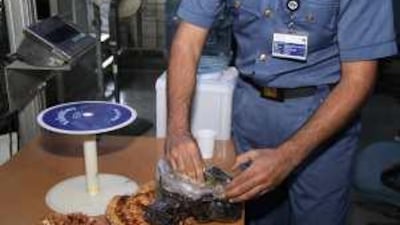DUBAI // Customs officers using the latest scanning technology have foiled an attempt by international smugglers to ship 11.5kg of raw opium through Dubai's Cargo Village by air freight. An international investigation is under way to hunt down those responsible after the drugs were discovered on Tuesday hidden inside spools of X-ray-absorbing carbon paper. They were in transit from Asia to Europe, a senior customs official said. Once processed, the opium would have been enough to make 1kg of pure heroin, worth at least US$30,000 (Dh110,000) on the streets of Europe.
If it had then been cut with other substances, it could have been sold for many times that amount. Mohammad Matar al Marri, the executive director of the cargo operations division at Dubai Customs, said it was unusual for such a large volume of narcotics to be smuggled by air as opposed to sea. One of the officers who discovered the shipment had only recently completed a training course in using advanced X-ray scanners, according to Mr al Marri.
He said the drugs had been wrapped in carbon paper, which can make it harder to detect drugs with older types of X-ray machines, but which does not interfere with the state-of-the-art devices that Dubai Customs have been using since last year. "I don't see the fact that one of the officers had just completed this course as a coincidence; the seizure is a result of our ongoing investment in training and technology.
"It is an interesting feature of this shipment, that the smugglers have tried to evade the machines," he said. "It's also unusual to see this quantity of opium being smuggled by air freight; normally a shipment this size would be transported by sea. "Because it was only in transit and was not meant to stay in the country, I think the smugglers were perhaps under the impression that we would not check it in Dubai and would just send it on - they maybe thought we did not have the legal right to examine the shipment."
Mr al Marri declined to identify either the country of origin or the destination of the drugs, but said an international investigation was under way to try to apprehend the smugglers. He said part of the credit for the find should go to the recently formed intelligence unit within Dubai Customs. With the aid of computer software that draws on data collected internationally on potentially suspect companies and individuals, the unit helps officers narrow down which of the millions of packages and containers that pass through the emirate they should single out for closer inspection.
"Dubai is a hub for the whole Middle East; 65 per cent of the goods that come in are in transit or for re-export, and a lot of people are trying to utilize the infrastructure for their own purposes. The smugglers think that because there is such a large volume of trade things can slip past unnoticed." He said that while the bulk of drug seizures in the UAE were destined for Europe or further afield, there had been a worrying rise in illicit substances that could end up on the streets here.
"A few months ago there was a big seizure of more than 650,000 tablets of Captagon" - a synthetic stimulant, counterfeit versions of which are often sold under the brand name. "That was really a major shock to us, to realise that there was such a large potential market here. "Most of that shipment was intended to be driven from Dubai to Saudi Arabia by road, but certainly some of it could have been sold in the UAE."
Mr al Marri acknowledged that the international drug trade was being helped by instability in the wider region. "It is difficult when you have places whose governments do not have full control over the whole area of the country. "The governments are trying their level best to co-operate with international bodies, but if they do not have control over their territory it can be exploited by criminals to grow and smuggle these items."
Ultimately, however, it was the insatiable appetite for drugs in Western countries, and the poverty in the developing world that drove people to make and sell them, that had to be addressed if the problem was ever to be resolved, Mr al Marri said. "When it comes to drugs, fighting the smuggling of them is only a part of it. The real issue is stopping people from using them, and that is something that involves health services, education; it is something everyone in society has to push for.
"Poverty is another part of it - people who do not have anything see smuggling as a way of life. You have to address the root causes. Drugs are a major issue for the world, and if countries can eliminate the demand, that is the way forward." gmcclenaghan@thenational.ae

